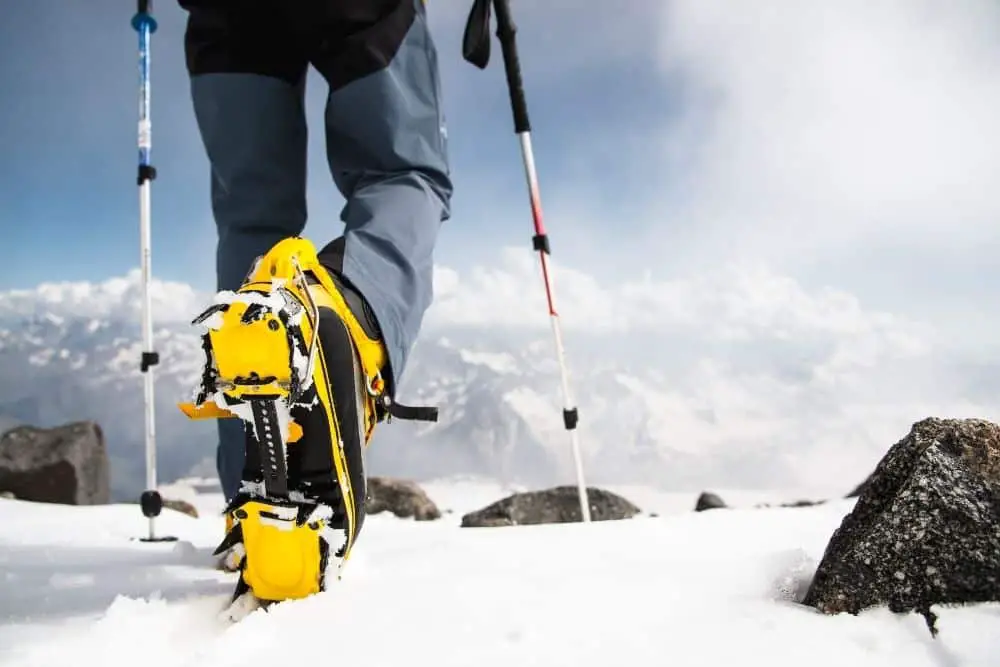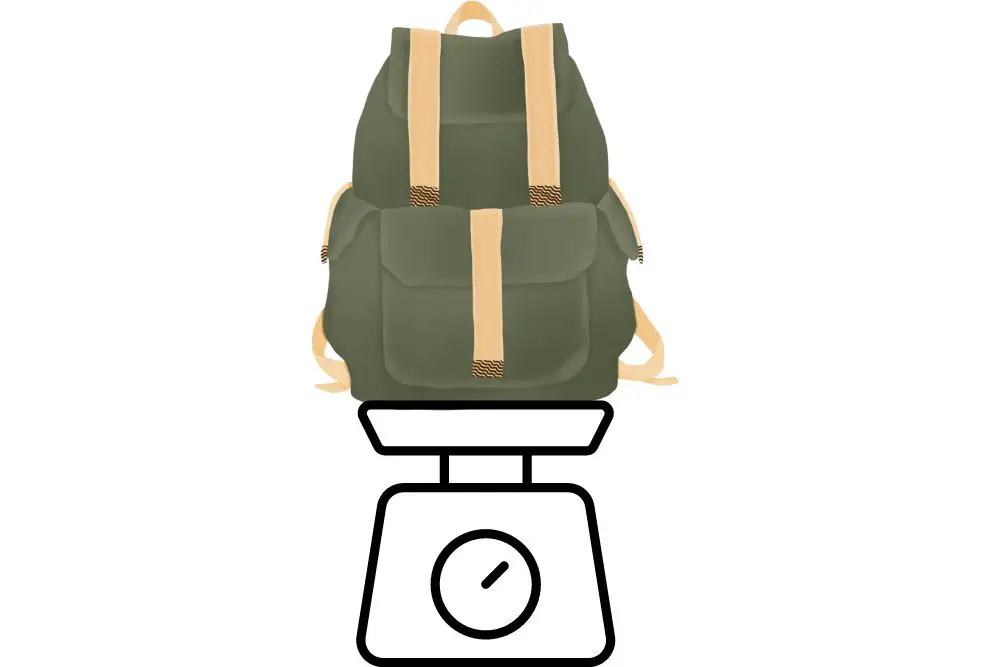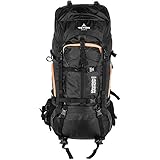When planning a hiking trip, choosing the right backpack is crucial. Hiking backpacks come in various sizes, shapes, and weights, and it can be challenging to determine which one to choose.
One of the most common questions hikers ask is, “How heavy should a hiking backpack be?”.
In this article, we’ll answer that question and provide a guide to choosing the right backpack weight for your needs.
How Heavy Are Hiking Backpacks and How Should They Be?
A lightweight backpack for hiking provides several advantages, including reduced strain on your body, increased maneuverability, improved endurance, easier packing and organization, and greater comfort and mobility.
By choosing a backpack that is lightweight, you can hike longer distances with less fatigue and enjoy a more comfortable and fulfilling experience on the trail.
The weight of your hiking backpack should be based on several factors, including the length of your trip, the amount of gear you need to carry, and your physical ability to carry the weight.
As a general rule of thumb, your fully loaded backpack should not exceed 20% of your body weight. For example, if you weigh 150 pounds, your backpack should not weigh more than 30 pounds
Additionally, it’s important to pack only the essential items you’ll need on your trip and leave behind any unnecessary gear to keep the weight of your backpack as light as possible.
Once you have a better idea of the weight range you should aim for, it’s time to start thinking about what to pack in your backpack.
Check out our article on ‘What to Pack in Hiking Backpack‘ for some helpful tips and suggestions on what essentials to bring with you on your next hike.

Guidelines for the weight of hiking backpacks based on your carried items:
It’s important to carefully consider what you’ll need for your trip and pack accordingly, without overpacking and making your hike unnecessarily difficult.
Daypacks:
Daypacks are small backpacks designed for day hikes. They typically range in size from 10 to 30 liters and weigh between 1 and 2 pounds.
Recommended weight when containing stuff: a lightweight backpack that weighs between 10 to 15 pounds is usually sufficient.
You’ll need to carry essentials like water, snacks, sunscreen, a first aid kit, and a rain jacket.
- 【PREMIUM & DURABLE & SUPER VALUE】: Sinotron lightweight hiking backpack is made of high-quality...
- 【22L CAPACITY & CONVENIENT DESIGN】: The main pocket is large enough to accomodate a lot of...
- 【PERFECT SIZE DAY PACK】: Recommendd by a lot customers for its perfect size and convenience. It...
Last update on 2023-11-11 / Affiliate links / Images from Amazon Product Advertising API
Overnight Backpacks:
Overnight backpacks are designed for overnight or weekend trips. They typically range in size from 30 to 50 liters and weigh between 2 and 5 pounds.
If added stuff inside, a backpack that weighs between 25 to 35 pounds is a good range to aim for.
This weight includes your sleeping bag, tent, cooking gear, food, and extra clothing.
- High-Quality Material:Hiking backpack is made of high quality rip-stop 210d nylon fabric,which is...
- Ergonomic and Comfortable Design:Thicker padded back with ergonomic breathable design paired with...
- Large Capacity & Multi Compartment: Maelstrom Hiking Daypack provides several pockets for handy...
Last update on 2023-11-11 / Affiliate links / Images from Amazon Product Advertising API
Multiday Backpacks:
Multiday backpacks are designed for longer trips, lasting several days or more. They typically range in size from 50 to 80 liters and weigh between 4 and 7 pounds.
Recommended weight when there is stuff inside: You’ll need to carry more gear and supplies, so your backpack will likely weigh between 35 to 50 pounds.
This weight includes all of the gear and supplies you’ll need for several days, including a sleeping bag, tent, food, water, and clothing.
- ONE BACKPACK FOR EVERY ADVENTURE: Internal frame backpack for hiking, backpacking, camping and...
- CUSTOMIZE YOUR FIT: Extra padded split waist band, hip and torso adjustments offer a perfect...
- DURABLE: Strong shell for the most rugged hiking and camping adventures; Multiple compression...
Last update on 2023-11-11 / Affiliate links / Images from Amazon Product Advertising API
Extended Trip Backpacks:
Extended trip backpacks are designed for trips lasting a week or more. They typically range in size from 70 to 110 liters and weigh between 6 and 9 pounds.
Plus your items, a backpack that weighs between 50 to 70 pounds should suffice. Or maybe more for heavily extended trips.
Extended trip backpacks are designed for longer hikes that can last several days or even weeks.
This weight includes all the gear and supplies you’ll need for an extended trip, including extra food, water, a sleeping bag, a tent, cooking gear, clothing, and gear for extreme weather conditions.
When packing for an extended trip, it’s important to prioritize weight and bring only essential items.
- Main compartment with U-shaped opening holds two pair of skis up to 185 cm.
- Padded divider panel and interior hold-down straps keep gear organized and prevent it from shifting...
- Center of bag is padded to protect bindings.
Last update on 2023-11-11 / Affiliate links / Images from Amazon Product Advertising API
Determine the weight of hiking backpacks based on terrain and environment:
It’s important to consider the terrain, environment, and weather when deciding how much your hiking backpack should weigh.
Mountainous Terrain:
If you’re hiking in mountainous terrain, you’ll need to be prepared for steep inclines and rocky terrain.
Aim for a backpack that weighs between 20 to 25 pounds for a day hike and between 35 to 45 pounds for an overnight hike.
Important gear:
- Sturdy hiking boots with good ankle support
- Trekking poles to help with balance on steep inclines
- Warm clothing layers for the temperature changes in higher altitudes
- First aid kit with items like bandages, pain relievers, and antiseptic wipes,
- An emergency shelter like a lightweight tent or bivy sack
- Headlamp or flashlight with extra batteries
- Water filtration system to purify water from streams and rivers
- Multi-tool or knife

Desert Environment:
Hiking in a desert environment means you’ll need to be prepared for extreme temperatures and limited water sources.
For a day hike, a backpack that weighs between 10 to 15 pounds is enough, while for an overnight hike, you can go for one with 20 to 30 pounds.
Or for a multiday hike, aim for a backpack that weighs between 45 to 60 pounds, while for an extended trip, your backpack can get up to 60 to 80 pounds.
Important gear:
- Sunglasses and a wide-brimmed hat and to protect you against the sun
- Lightweight and breathable clothing to keep cool in high temperatures
- Extra water bottles or hydration reservoirs to carry more water
- High SPF sunscreen and lip balm to protect against the sun’s rays
- Emergency whistle to signal for help in case of emergency
- Maps and a compass or GPS device to navigate through the terrain
- Snake bite kit if hiking in an area with venomous snakes
- A lightweight, portable shelter like a tarp or emergency bivy sack

Wet or Cold Weather:
If you’re hiking in wet or cold weather, you’ll need to bring extra clothing and gear to keep warm and dry.
For a day hike, aim for a backpack that weighs between 15 to 20 pounds, while for an overnight hike, your backpack can weigh between 30 to 40 pounds.
For a multiday hike, you should choose a backpack that weighs between 50 to 70 pounds, while for an extended trip, it can be allowed up to 70 to 90 pounds.
Important gear:
- Insulated and waterproof boots to keep feet warm and dry
- Warm layers like a fleece or down jacket and a waterproof rain jacket
- Waterproof pants or gaiters to keep legs dry in wet or snowy conditions
- Extra gloves, hats, and socks to keep extremities warm
- An emergency shelter like a lightweight tent or bivy sack
- Water-resistant matches or a lighter to start a fire for warmth
- Hot beverages like tea or cocoa to warm up in cold conditions
- Ice axe and crampons for more technical and icy terrain.

Conclusion
Choosing the right hiking backpack is essential for a successful hiking trip. When deciding how heavy your backpack should be, consider the length of your trip, the amount of gear you need to carry, and your physical ability to carry the weight.
Remember, these are just general guidelines, and the weight of your extended trip backpack will depend on factors like the length of your trip, the terrain you’ll be hiking on, and your personal physical ability.
Always make sure you are comfortable carrying the weight of your backpack and adjust your gear and supplies accordingly to ensure your backpack is not too heavy or bulky.





